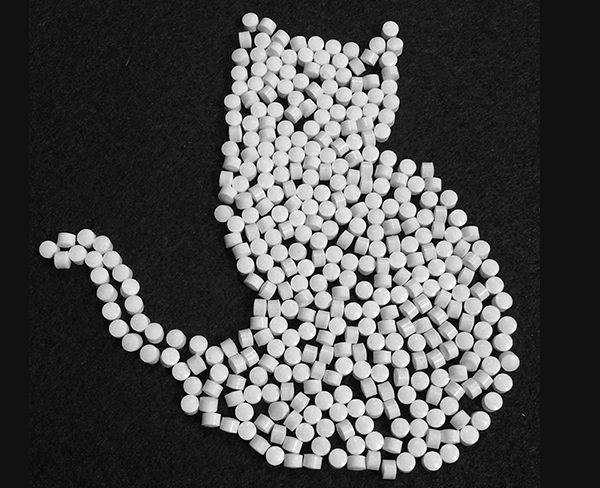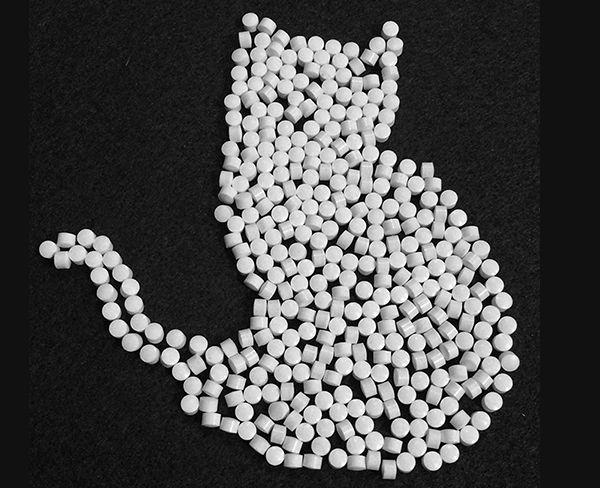
Credit: Jaana Hautala
Of all pets, cats are often considered the most difficult ones to medicate. Very small minitablets with flavours or flavour coatings can help cat owners commit to the treatment and make cats more compliant to it, while making it easier to regulate dosage and administer medication flexibly.
In her dissertation, Jaana Hautala, MSc (Pharmacy), is seeking solutions for facilitating the medication of cats. In order for the oral medication of pets to succeed, the animal must enjoy the taste of the medicine and find it appealing. Palatability is essential both in acute cases and in the treatment of chronic illnesses which require regular, constant medical treatment. Successful treatment of pets is also necessary to ensure the health and wellbeing of humans, communities and the environment.
– Improving palatability through minitablets and synthetic flavourings and coatings tailored for animals improves both the owner's commitment to the treatment and the cat's compliance. They also facilitate the dosage of the medicine and make the administration of the treatment more flexible in the treatment of cats and other pets, says Hautala.
Cats place many demands on their medicine
Of all pets, cats are often considered the most difficult ones to medicate. Both cats and dogs are popular pets, but there are many differences between the two. In terms of oral medication, the most important difference has to do with the preferred foods, eating habits and taste preferences of the two animals. While dogs are omnivores, cats are almost exclusively carnivorous.
Another factor making the treatment of cats more difficult is the fact that few registered drugs have been tailored and made palatable specifically for cats. This means that veterinarians often have to resort to canine drugs to treat cats, and adjusting the dosage to suit the much smaller animal may be challenging for the pet owner. In addition, if cats find the taste, smell, shape or mouthfeel of the drug unpleasant or repulsive, they will refuse the medication, making the administration of the drug more difficult and possibly leading to the complete failure of the treatment altogether.
In search of the optimal taste and smell
In her research, Hautala sought a solution for commercially manufactured, palatable minitablets for the oral treatment of domestic cats in a convenient, flexible manner. The goal was to improve the palatability of the treatment as well as the comfort and treatment compliance of the animals and to boost the commitment to the treatment.
At first, Hautala studied how palatable different types of placebo tablets were to cats. The results were encouraging, particularly since the study involved typical domestic cats and their owners, and the administration of the tablets took place at home, meaning it corresponded to a real-world treatment situation. The study established that domestic cats found the minitablets more palatable than food that was known to be disliked by the pet. However, the results indicate that the flavour and odour of the minitablets must be improved. The fact that the cat owners found the minitablets easy to handle is also significant.
In the second part of the study, synthetic flavourings were used to improve the taste and smell of the minitablets. In the study, Hautala found that potential flavourings for further studies on minitablets could include amino acids, which are known as meat flavour precursors, as well as vitamin B, which is plentiful in yeast extract.
Hautala also studied new flavour coatings and the suitability of atomic layer deposition (ALD) for coating minitablets and improving their palatability. Of the flavourings in the study, substances commonly used as synthetic meat flavours could be considered particularly appropriate for further studies on minitablet coatings. ALD is a promising method, but its use as a pharmaceutical coating is challenging, so further research is required.
Hautala's results are hoped to support cost-effective research and the development of palatable feline medications.
###
Media Contact
Jaana Hautala
[email protected]
358-405-688-845
@helsinkiuni
http://www.helsinki.fi/university/
############
Story Source: Materials provided by Scienmag





